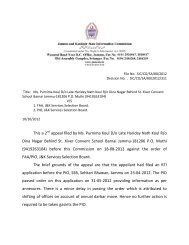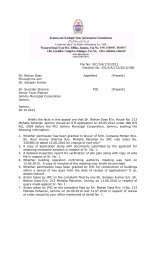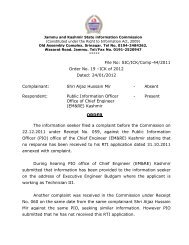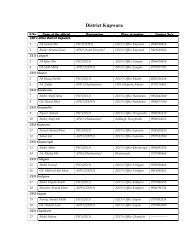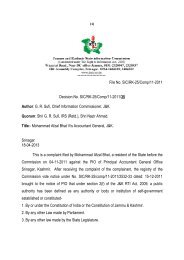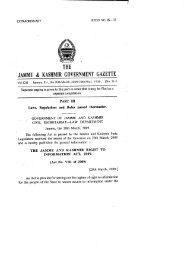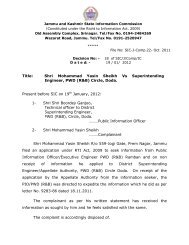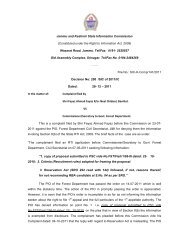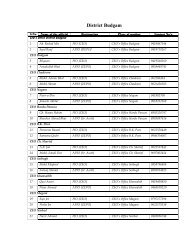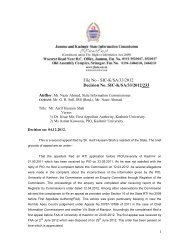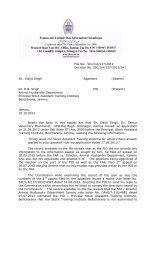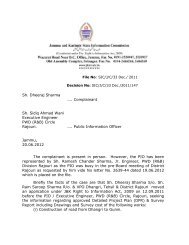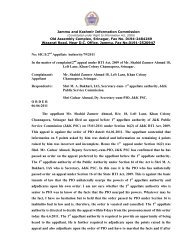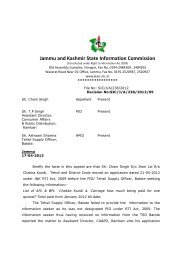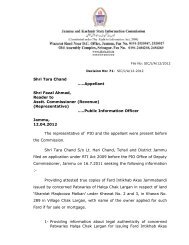SIC-K/01/2011 - State Information Commission
SIC-K/01/2011 - State Information Commission
SIC-K/01/2011 - State Information Commission
Create successful ePaper yourself
Turn your PDF publications into a flip-book with our unique Google optimized e-Paper software.
Jammu and Kashmir <strong>State</strong> information <strong>Commission</strong><br />
(Constituted under the Right to <strong>Information</strong> Act, 2009)<br />
Old Assembly Complex, Srinagar. Tel/Fax No. <strong>01</strong>94-2484269<br />
Wazarat Road, Jammu. Tel/Fax No. <strong>01</strong>91-2520947<br />
*****<br />
No. <strong>SIC</strong>-K/<strong>01</strong>/2<strong>01</strong>1<br />
Decision No: 147-<strong>SIC</strong>/K/Comp/2<strong>01</strong>1<br />
Dated :- 21-09-2<strong>01</strong>1<br />
2 nd APPEAL<br />
Title:- Dr. Raja Muzaffar Bhat V/S 1 st Appellate Authority, General<br />
Administration Department.<br />
Present before the SCIC:<br />
1. Shri G. S. Chib<br />
Spl. Secy. GAD<br />
- 1 st Appellate Authority<br />
2. Dr. Raja Muzaffar Bhat, - Appellant<br />
Dr. Raja Muzaffar Bhat, a resident of the <strong>State</strong> had sought<br />
information from the PIO General Adm. Department (GAD) J&K vide his<br />
application dated 23 rd April, 2<strong>01</strong>0. The information so sought is as under:-<br />
1. Details of Annual Property <strong>State</strong>ment of IAS/KAS officers.<br />
2. How many IAS/KAS officers have been submitting their annual<br />
property statements regularly (annually) with details of officers<br />
for the last 10 years.<br />
3. How many IAS/KAS officers have not submitted their annual<br />
property statements since last 10 years – with details why <br />
The reasons thereof.<br />
The PIO General Adm. Department passed an order on 23 rd<br />
June, 2<strong>01</strong>0 refusing the information by invoking Section (f) and (i) of the<br />
<strong>State</strong> RTI Act 2009. The information seeker filed 1 st Appeal on 04.<strong>01</strong>.2<strong>01</strong>1
efore the Commr./Secretary to Government, General Adm. Department<br />
challenging the reasoning of the PIO for withholding the information. The<br />
1 st Appellate Authority also rejected the 1 st Appeal of the appellant<br />
contending therein that Section 8 (f) and (i) were involved and held that<br />
declaring of the information with regard to the annual property statements<br />
of IAS and KAS officers would cause un-warranted invasion of privacy of<br />
the individual besides the disclosure of the information to the appellant<br />
shall not serve larger public interest and also has no relationship to the<br />
public activity.<br />
After the 1 st Appeal having been rejected, the<br />
complainant/appellant approached this <strong>Commission</strong> that with 2 nd Appeal<br />
under Section 16 (4) of <strong>State</strong> RTI Act, 2009 on 17 th March, 2<strong>01</strong>1 which was<br />
received in this commission 15.4.2<strong>01</strong>1. During the hearing, S/Shri Syed<br />
Nassarulla, Raja Mohammad Amin and Mohd. Shafi Rangrez were allowed<br />
to act as interveners and the case was heard on 08.06.2<strong>01</strong>1. The<br />
<strong>Commission</strong> after considering various issues and the respondent’s<br />
submissions, held that in this case Section 11 was found to be applicable.<br />
Accordingly, after taking all facts into consideration, the order passed by<br />
the 1 st Appellate Authority on 10.02.2<strong>01</strong>1 was remanded to the 1 st<br />
Appellate Authority to fulfill the requirements laid down in Section 11 of the<br />
Act. The 1 st Appellate Authority was given the following directions:<br />
“The <strong>Commission</strong> further observed that Section 11 of the<br />
<strong>State</strong> RTI Act is involved in this case and entire information<br />
which is requested to be disclosed pertains to third<br />
party/parties. Hence the mater is remanded to the 1 st<br />
Appellate Authority to fulfill the requirements laid down in<br />
Section Section 11 of the <strong>State</strong> RTI Act 2009. The objections,<br />
if any, from any third party/parties have to be sought within<br />
the time limit provided under Section 11(2). The 1 st Appellate<br />
Authority is further directed to weigh the objections, if any,<br />
raised by the third party/parties and decide whether public
interest in disclosure outweighs in importance any possible<br />
harm or injury to the interests of such third party/parties.<br />
The 1 st Appellate Authority is directed to issue fresh order<br />
within 30 days from the pronouncement of the order as<br />
mutually agreed by the parties.”<br />
This was done precisely because there are three parties<br />
involved in this case: 1 st the information giver(s) regarding properties held<br />
by him/them; 2 nd<br />
the retainer of the information i.e. the Government<br />
agencies who use these immovable property statements for their use for<br />
administrative and sometimes for vigilance matters and the 3 rd<br />
is the<br />
parties who now seek the details of such information under Section 6 of the<br />
<strong>State</strong> RTI Act 2009. Had the <strong>Commission</strong> not done this, the <strong>Commission</strong>’s<br />
orders if any passed, on the adjudication of the 1 st<br />
might have suffered with serious legal infirmity.<br />
Appellate Authority<br />
The 1 st Appellate Authority has complied with the directions<br />
given vide this <strong>Commission</strong>’s ordered dated 08.06.2<strong>01</strong>1. The 1 st Appellate<br />
Authority did ask for the objections, if any from all the IAS/KAS officers of<br />
the <strong>State</strong> through two leading newspapers each of Jammu and Srinagar<br />
administrative Divisions of the <strong>State</strong>, besides, through the departmental<br />
website of GAD on 24.08.2<strong>01</strong>1. The objections were called orally and in<br />
writing. As per the 1 st Appellate Auithority only some of the KAS/IAS<br />
officers gave objections within the prescribed time. It is important to note<br />
that the 1 st Appellate Authority has confirmed that some officers have not<br />
raised any objections for any such disclosure. The 1 st Appellate Authority<br />
has agreed with few officers who have objected to the disclosure of<br />
information on the please that it will tantamount to invasion of the privacy<br />
of the individual and shall expose the officers to all sorts of risks by<br />
endangering their lives. Besides, the disclosure of information is not going<br />
to serve the larger public interest and has no relation to public activity. On<br />
this finding the 1 st Appellate Authority has rejected the appeal of the
appellants holding that there was no reason and ground to interfere with<br />
the decision dated 10.02.2<strong>01</strong>1 already taken in the appeal. In brief the 1 st<br />
Appellate Authority has confirmed the findings of the PIO not to disclose<br />
the information to the information seekers.<br />
The appellant has appealed against this <strong>Commission</strong>’s order<br />
dated 08.06.2<strong>01</strong>1. This <strong>Commission</strong> has considered the 1 st<br />
Appellate<br />
Authority’s order dated 12.08.2<strong>01</strong>1. The sample of objections given by a<br />
few officers has been gone through. Section 8 (i) is to be reproduced to<br />
understand and comprehend the situations in which the information has to<br />
be disclosed eve if prima facie the said information is personal information,<br />
the disclosure of which has no relation with public activity and the interest<br />
or such disclosure would cause an unwarranted invasion of the privacy of<br />
the individuals. The clause (i) of Section of 8 of the <strong>State</strong> RTI Act 2009 is<br />
as under:<br />
“<strong>Information</strong> which relates to personal information the<br />
disclosure of which has no relationship to any public activity<br />
or interest, or which would cause unwarranted invasion of the<br />
privacy of the individual unless the Public <strong>Information</strong> Officer<br />
or the appellate authority, as the case may be, is satisfied that<br />
the larger public interest justifies the disclosure of such<br />
information;<br />
Provided that the information which cannot be denied to<br />
the Parliament or the <strong>State</strong> Legislature shall not be denied to<br />
any person.”<br />
The above clause further provides that the information which<br />
cannot be denied to the Parliament or the <strong>State</strong> Legislature shall not be<br />
denied to any person.<br />
This proviso has to be read in consonance with<br />
clause (i) of Section 8and not in isolation. Of course, the first limb of<br />
Section 8 (i) read with Section 11 of the <strong>State</strong> RTI Act 2009 is that if third<br />
party objects then if 1 st<br />
Appellate Authority finds that the disclosure of<br />
information will not serve any public purpose not to talk of larger public
purpose then information has not to be disclosed. Here in this case it is an<br />
open fact that number of KAS officers have not at all objected to the<br />
disclosure of any information. IAS officers are already under<br />
directions/instructions from Department of Personnel and Training, Govt. of<br />
India that all their immovable Returns will be hoisted on the official website<br />
of the department. This has been reiterated by even J&K Government vide<br />
its circular issued under No. 18-GAD of 2<strong>01</strong>1 dated 11.05.2<strong>01</strong>1 dated<br />
11.05.2<strong>01</strong>1.<br />
As per the reports most of the officers have complied with the<br />
instructions and it can be safely held that such officers have made<br />
compliance with the instructions in letter and spirit of the RTI Act, the aim<br />
of which is to bring transparency in the system. A debate could be there<br />
whether a particular information seeker has any absolute right under the<br />
provisions of the Section 8 read with Section 11 of the <strong>State</strong> RTI Act 2009<br />
to ask such information in his individual capacity from any Government<br />
officer who has already complied with the directions of his Government and<br />
has hoisted his details of immovable property on the website which is<br />
known to everyone. Therefore, this commission is unable to understand<br />
the rationale of objections given by a minuscule number of <strong>State</strong> KAS<br />
officers before the 1 st Appellate Authority for not disclosing the APRs. It<br />
would have been relevant had they qualified the disclosure by referring to<br />
the Government of India instructions. Only five officers have objected and<br />
the reasoning of their objections is as under:<br />
“….that the appellant, Dr. Raja Muzaffar Bhat has not<br />
mentioned any specific reason or purpose for which such personal<br />
information is required.<br />
That undedr the RTI Act, personal information cannot be<br />
sought by the third party unless it is required for the public<br />
purpose;<br />
That we are the field officers and due to prevailing law and<br />
order situation our property at times becomes targets for attach.<br />
Sharing such information with third party without any cogent
eason or specific purpose is against the mandate of Law and<br />
purpose of the Act. Once this information is shared with any third<br />
party, then there is every apprehension that the properties of the<br />
undersigned will get targeted due to law and order problem, which<br />
will adversely affect the property and inmates of the said property.<br />
SECURITY:<br />
So in this perspective, it is requested that such personal<br />
information which rests with General Adm. Deptt. and Vigilance<br />
Organization should not be shared with third party especially due<br />
to prevailing law and order situation. There are instances where in<br />
the past, properties of officers have been targeted by the mob and<br />
in our case who deal with execution of J&K Public Safety Act and<br />
other law and order issues such vulnerability is much more.<br />
….there have been quite good number of cases in the country<br />
where the children of some high profile private sector executives<br />
have been kidnapped for ransom. Even some private sector<br />
employees drawing huge salaries also expressed their reservations<br />
to media regarding disclosure of their income as it has security<br />
implications. As per media reports some huge money have been<br />
demanded and recovered from the private section executives as<br />
their income was known to criminal elements, so the honest<br />
disclosure of the property will amount to security risk to the family<br />
members of the employees.<br />
The security situation in Jammu and Kashmir continues to be<br />
fragile and majority of the employees do not have the security<br />
cover especially to their families so the sharing of this information<br />
can become a big threat from criminals to the employees and their<br />
family members. These aspects may be taken into consideration<br />
before a decision is taken regarding sharing the information<br />
disclosed in the property statement of the employees including the<br />
undersigned in the public domain.<br />
…..It has been seen such RTI applications seeking this<br />
information is sought in order to be used as tool to harass people.<br />
In one similar case a family dispute has arisen in case of one of our<br />
lady officer in whose case the father-in-law has been asking for<br />
information regarding her pay, emoluments, leave, etc. The same<br />
has been rejected on the ground of exemption provision available<br />
in the Act.<br />
Since the third party has chosen to seek information totally<br />
private to individuals even though public servants, it would be in
the fitness of things if he would first declare his assets and the<br />
manner in which the same have been acquired before seeking<br />
similar information viz-a-viz other citizens and give cogent reasons<br />
that compel him as a citizen to seek such information.”<br />
This reasoning has not been mandated as per the <strong>State</strong> RTI Act<br />
2009 under Section 6 (2), which is reproduced as under, which has<br />
expressly provided for non-furnishing of any reason by the information<br />
seeker:<br />
“An applicant making request for information shall not be required to<br />
give any reason for requesting the information or any other personal<br />
details except those that may be necessary for contacting him.”<br />
With regard to the 1 st Appellate Authority’s contention that the<br />
supply of information would not serve the larger public interest, the<br />
<strong>Commission</strong> is of the considered opinion that this contention is not correct.<br />
The very concept of public servant implies that the Government servant<br />
has to serve in and for the interest of public at large in a system that we<br />
have under the constitution of India and the constitution of the <strong>State</strong>. The<br />
Government is nothing but a representative of the people and the agents<br />
of the Government through which the Government is run are Government<br />
servants. Hence if the assets acquired and obtained by the public servants<br />
out of their own funds which flow from Government exchequer, the<br />
Government exchequer being nothing but a contribution of people, then<br />
an argument is rightly made that the public have interest to know the<br />
details of assets which are acquired through the public funds. The concept<br />
of the disclosure, if any, has gathered strength and popularity with the<br />
introduction of <strong>State</strong> RTI Act 2009.<br />
This concept has been elaborately<br />
discussed by the Hon’ble High Court Madras in its judgment in the case<br />
titled The Tamil Nadu <strong>Information</strong> <strong>Commission</strong> v/s Secretary, Public<br />
Department, Government of Tamil Nadu Writ Petition No. W.A No. 551 of
2<strong>01</strong>0. It is worth to quote some relevant observations of the Hon’ble High<br />
Court Madras’s in the above mentioned judgment:<br />
“….it is now widely recognized that openness and accessibility<br />
by the people to information is a vital component of democracy.”<br />
With regard to the objections raised by some worthy IAS/KAS<br />
officers as referred to above particularly the objection that the details of<br />
assets held by them will fall in the category of personal information which<br />
is protected by Section 8 (1) (i) of the <strong>State</strong> RTI Act 2009, the Hon’ble<br />
High Court Madras in the above referred to judgment has held that if a<br />
Government servant furnishes the assets details to the Government and if<br />
he is accountable to file such assets details as required under the relevant<br />
rules, such information relevant to assets cannot be considered to be public<br />
information which are inaccessible by the Government.<br />
Hence “the<br />
information relating to assets declaration of IAS officers cannot be said to<br />
be information which cannot be accessed by the public authority. As those<br />
informations are either not more confidential or private informations.” The<br />
Hon’ble High Court Madras has in detail discussed the applicability<br />
otherwise of Section 8 (j) of the Central <strong>Information</strong> <strong>Commission</strong> Act which<br />
is verbatim reproduced in Section 8 (1)(i) of the <strong>State</strong> RTI Act 2009. The<br />
Hon’ble Madras High Court has correctly held that even if personal<br />
information is protected which has not to be said to be intrusion of privacy<br />
nevertheless it has been held that even in case of personal information in<br />
the event the authorities are satisfied that the larger public interest<br />
justifies the disclosure of such information, the information sought cannot<br />
be denied.<br />
or<br />
The Hon’ble High Court, Madras has however noted that as the<br />
details of assets of worthy IAS officers have been hoisted on the website<br />
therefore privacy clause no more holds good. Similarly the Hon’ble High
Court, Madras has not agreed with the view that the <strong>State</strong> holds such<br />
declaration of assets in confidence. Therefore, the right of the information<br />
seekers to know the details of assets of the public servants cannot be thus<br />
denied. On the same corollary and analogy, the KAS officers cannot take<br />
the plea that they are covered under Section 8 (1) (i) of the <strong>State</strong> RTI Act<br />
2009. It is, however important to observe that the objections have been<br />
given only by a very few officers and majority of the officers have not<br />
objected at all. Therefore, it is implied that majority of the KAS officers<br />
are in favour of the transparency which, in principle is ordered by the<br />
<strong>Commission</strong>.<br />
However, there are important objections raised by these<br />
officers and these are with regard to security scenario which is prevalent in<br />
the J&K <strong>State</strong> presently. But the <strong>Commission</strong> is constrained to observe<br />
that there is no express prohibition in the Act in this regard. The worthy<br />
IAS officers are at times performing more important functions and<br />
responsibilities with regard to law and order and security problems and<br />
they are obviously in senior positions than the KAS Officers. However, the<br />
<strong>Commission</strong> is also conscious of the fact that the IAS officers have hoisted<br />
only immovable property details on the website, which is in accordance<br />
with the Immovable Property Return of All India and Central Services<br />
Rules. On the principle of equity, same principle should be applied to the<br />
KAS officers. The <strong>Commission</strong> holds that they should hoist such<br />
immovable property details on government website which are owned and<br />
acquired by them out of their own sources of income and assets which are<br />
owned by their family members or spouses out of their own sources and<br />
Stree Dhan need not to be hoisted on the website because the IAS officers<br />
have not done the same. The <strong>Commission</strong> had already informed the FAA<br />
about this decision on the date when last hearing took place in this case.<br />
The decision is accordingly made public.
There is another limb in the application filed by Dr. Raja<br />
Muzaffar Bhat which is under:<br />
i. How many IAS/KAS officers have not submitted their Annual<br />
Property statements since last 10 years – with details – why <br />
the reasons thereof.<br />
It is surprising that even this information was denied by the<br />
PIO and FAA without any cogent and convincing reasons. In view of the<br />
detailed reasons given above the <strong>Commission</strong> holds that such information<br />
be also hoisted on the website of General Adm. Department.<br />
compliance to this order be made within 15 days from the receipt of this<br />
order with the compliance report to this commission.<br />
The<br />
While concluding, an argument was made before this<br />
<strong>Commission</strong> to the effect that why to fix such responsibility only on worthy<br />
IAS/KAS officers for hoisting such information and why not to bring other<br />
gazette service and senior officers of other departments of the J&K<br />
Government under this ambit. The <strong>Commission</strong> is not competent under<br />
the <strong>State</strong> RTI Act 2009 to pass any judgment on this account. This is left<br />
to the wisdom and discretion of the <strong>State</strong> Government.<br />
The 2 nd Appeal is accordingly disposed of.<br />
Copy to :<br />
Sd/-<br />
(G. R. Sufi)<br />
<strong>State</strong> Chief <strong>Information</strong> <strong>Commission</strong>er<br />
1. Shri G. S. Chib, Spl. Secy./1st Appellate Authority, GAD, J&K.<br />
2. Dr. Raja Muzaffar Bhat, Appellant.<br />
3. Guard File.<br />
Sd/-<br />
(M. A. Wani )<br />
Joint Registrar<br />
<strong>State</strong> <strong>Information</strong> <strong>Commission</strong>



